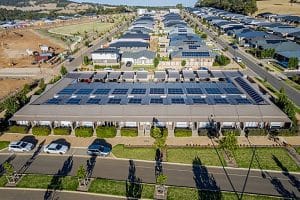A new report from the International Renewable Energy Agency (IRENA) shows how a worldwide target of 36 percent renewable energy by 2030, combined with energy efficiency measures, would effectively stop global temperatures rising above two degrees Celsius by the end of the century.
The renewables boost would deliver up to half the required emissions reductions required for humanity to avoid catastrophic climate change, with energy efficiency providing the rest, said Adnan Z. Amin, IRENA Director-General.
“The energy sector accounts for more than two-thirds of global greenhouse gas emissions, and therefore must be the focus of climate action,” he said.
“Transitioning rapidly to a future fuelled by renewable energy, accompanied by increasing energy efficiency, is the most effective way to limit global temperature rise. This transition is underway but it must be accelerated if we are to limit global temperature rise to two degrees Celsius.”
The REthinking Energy 2015 report has been released in the lead-up to December’s UN climate summit in Paris, when world leaders will converge to present their nations’ policy pledges on emissions abatement, aka Intended Nationally Determined Contributions (INDCs).
The United Nations INDC protocol calls for the stabilisation of greenhouse gas concentrations in the atmosphere “at a level that would prevent dangerous anthropogenic interference with the climate system”.
According to IRENA, preliminary INDCs submitted for Paris do offer far higher greenhouse reductions compared to previous pledges, but when modelled and scaled up to global levels, total greenhouse emissions still amount to 53-55 gigatonnes (Gt) of carbon-dioxide equivalent (CO2eq) in 2030, 17 Gt above the threshold required to avoid a two degrees temperature rise.
Under this business as usual model, the report finds global temperatures would rise 2.7C by 2100.
But boosting renewable energy to a 36 percent share – a six-fold increase on current levels – significantly changes these projections, and IRENA’s plan outlines several actions for achieving it, including:
– Nearly doubling global annual investment in renewables from USD 270 billion to exceed USD 500 billion in the period up to 2020, then tripling it to exceed USD 900 billion from 2021 to 2030, with an emphasis on public spending as a catalyst for private investment.
– Strengthening policy commitment to renewable energy.
– Harnessing the cost-cutting impact of RE and sustainable development.
“The strong business case for renewable energy has made the energy transition inevitable,” said Mr. Amin. “It is now not a question of if the world ultimately transitions to a renewable energy future, but rather whether it will do so quickly enough. At the upcoming climate talks in Paris, it will be up to countries to commit to strong targets, and in turn, give a strong political signal to catalyse further investments in renewable energy.”
REthinking Energy can be viewed in full here (PDF)







































